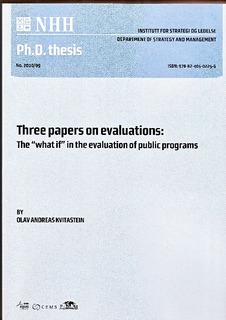| dc.contributor.author | Kvitastein, Olav Andreas | |
| dc.date.accessioned | 2010-07-05T09:27:55Z | |
| dc.date.available | 2010-07-05T09:27:55Z | |
| dc.date.issued | 2010 | |
| dc.identifier.isbn | 978-82-405-0225-6 | |
| dc.identifier.uri | http://hdl.handle.net/11250/164352 | |
| dc.description.abstract | SUMMARY:
The “What if” in the evaluation of public programs: An appraisal of methodologies and
practices
Three papers on related topics concerning methodologies and practices of the
evaluations of public programs constitute the dissertation. The first paper demonstrates the
applicability of observational methods for the assessment of the program level contributions
of two Financial Schemes and two Governmental intervention programs from the prede-
cessors of Innovation Norway in the early nineties:
The Regional Venture Capital Loans program aims at compensating presumed
regional funding disadvantages, the Investment Grants at stimulating physical investments in
buildings, machinery, and equipment. The FRAM program aims at enhancing leadership
skills while the Network program tries to encourage cooperation between companies. The
raison d’être for all four initiatives is a presumed market failure and the public benefits from
compensating an assumed funding gap when positive externalities are expected.
The paper is based upon the view that matching routines are nonparametric pre-
processing methods that facilitate further analysis. A combination of covariate matching and
difference-in-differences analysis is employed for finding the best possible estimates for the
effects of the programs under scrutiny.
The analyses suggest that at least two of the four initiatives produce positive contribu-
tions and produce lasting impacts that are observable for a considerable period following par-
ticipation.
The second paper concerns a leadership-training program for SME’s. Over a period of
eight to fourteen years after key managers completed the program we have traced the effects
of the program on the performance of participating firms. Transition rate methods are applied
in order to assess the survival of participating firms. The key findings are that the impact of
the training program with respect to survival is negligible and that this overall effect can be
decomposed into a positive impact upon the mature participating firms and a catastrophic
negative effect on the newcomers; the newly established firms that participated.
The third paper discusses the methodological cleavages within the evaluation commu-
nity. The history of evaluation has produced a number of sub-fields based on different parent
disciplines. Strong paradigmatic commitment to own sub-discipline and corresponding rejec-
tion of competing world-views may lower the overall trust in evaluations. Since New Public
Management predominantly is based on a popular notion of economics, this is the story of
how pluralism meets monism. The conclusion is that the methodological heterogeneity of
evaluation research may be deteriorating with respect to public trust in social science based
evaluations. | en |
| dc.language.iso | eng | en |
| dc.publisher | Norwegian School of Economics and Business Administration | en |
| dc.relation.ispartofseries | Ph.D. thesis NHH | en |
| dc.relation.ispartofseries | 2010:9 | en |
| dc.title | Three papers on evaluations : the "what if" in the evaluation of public programs | en |
| dc.type | Doctoral thesis | en |
| dc.subject.nsi | VDP::Samfunnsvitenskap: 200::Statsvitenskap og organisasjonsteori: 240::Offentlig og privat administrasjon: 242 | en |
| dc.description.localcode | nhhphd | |
